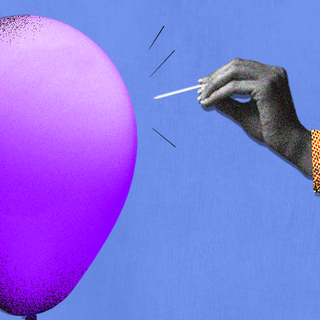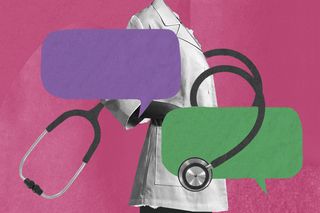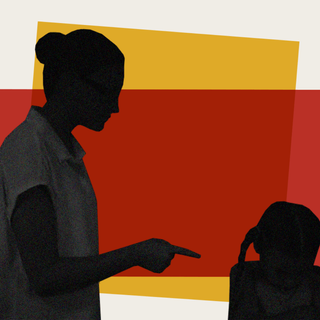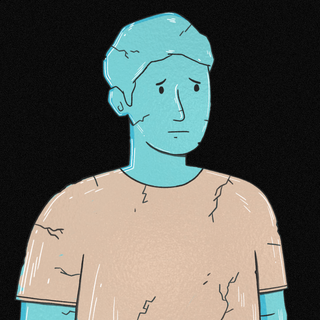
Body Matters: Navigating Asexuality in a Gynaec’s Office
“She spent the entire consulting session telling me… that there is no such thing as asexuality or demisexuality”

In ‘Body Matters,’ we explore the lived experiences of OB-GYN patients in India who defy stereotypical gender expectations, and challenge what it means to be a body that matters in medicine.
Going to a gynaecologist is a fraught experience for many people in India. But going to a gynaecologist as an asexual person can be even more so — so much so that many don’t go back. Incorrect or ignorant assumptions about sexuality, sexual maturity, adulthood, and desire leads to a breakdown of trust between ace patients and doctors. Patients feel invalidated as a result and find it difficult to articulate their health concerns, affecting overall treatment. Two patients – “K,” who wishes to be anonymous, and Tejaswi Subramanian, editor of Gaysi, share their experiences. Two doctors – Dr. Renuka Dangare and Dr. Ankita Gharge – explain why it happens and what doctors can do about it.
When Doctors Say the Wrong Thing
The language that practitioners use can put people off accessing care and do real damage. Healthcare providers who don’t understand or attempt to listen to lived experiences of asexuality often pathologize it as “abnormal.” For instance, even the idea of being “sexually active” is a fraught question that leads to medically irrelevant assumptions – as K and T explain.
K: I started out not knowing about my identity as ace, and generally felt no sexual attraction. Out of curiosity, in my early twenties, I reached out to an OBGYN to ask. This is around 10 years ago, and one did not have space to explore these things as some do today. [The doctor] immediately pathologized me. She said I was possibly in need of hormone-based interventions and counselling because what “I was going through was not normal.”
[Another] one asked “if I was married,” which in the course of conversation, I realized was code for “Are you sexually active?” By this time, though, I came to understand that ace is an orientation, and discovered that I am actually demisexual. I told her so, and she spent the entire consulting session telling me that it is all in my head
T: Every time I’ve gone to a gynaecologist or any healthcare provider [about] my sexual or reproductive health, I’ve always felt uncomfortable in the sense that they seem to have all power and all knowledge in the situation, and they’re asking me very specific questions which I don’t really know what they mean in the context of what they’re helping me with, but it also feels like a moral judgement. I remember somebody said that it is better to ask “Are you sexually active?” as opposed to “Are you married?”, but I feel like that is such a loaded question too. What does it mean to be sexually active? It’s not just penis in vagina, it never was, and as queer people we’re also always talking about how it isn’t just that.
Such lines of questioning lead to an inaccurate assessment of patients and their histories. “If a patient says they’re okay with kissing and not penetrative sex — we don’t know how to have that conversation, and that leads to problematic question asking. We are not trained well to ask about sexual history either,” says Dr. Renuka Dangare.
Uninformed language compromises patient care, but there’s also more to the issue. Doctors tend to assume traumatic histories if someone presents with a relatively lower sex drive. In other words, not only do patients face judgement, they can also face invasive questioning or unsolicited treatment stemming from a lack of understanding of the nuances of asexuality as a lived experience.
Related on The Swaddle:
Asexuality Is a Sexual Orientation, Not A Disorder
“If you’re really worried about your patient’s history, say: ‘I fully understand, I just want to run a quick question for the sake of your safety — is there any incident or any uncomfortable experience that you’d like to share with me?’ If they say no, move on,” explains Dr. Dangare. “There are also different ways of framing the question — ‘Is there something you’d like to share/ Are there other things to be careful about/ Would you like to reach out to a mental health provider?’”
Adopting a practice of explaining the steps of care involved and being more accountable to patients also helps bridge the gap and make the experience less intimidating. Further, with there being such little access to information about asexuality, framing conversations around experiences rather than the vocabulary of sexuality can help patients who may not explicitly say they are asexual. This means challenging the assumed norm of allosexuality in gynaecology, which is a radical but necessary step.
When Doctors Make Assumptions
As patients on the asexuality spectrum, K and T frequently encountered doctors assuming interest in sexual activity as the default “normal,” with marriage as a natural follow-up. K and T recount some deeply hurtful and medically unsound comments.
K: I went back to [a gynac] for a general check-up and one of the things she asked me was if I was sexually active. When I told her I wasn’t, she spent a couple of minutes on the consultation “counselling” me about how I would not have a successful “marriage” if I was not willing to open up to the idea of sex, and that I was effectively being fussy, choosy, and “very deeply into pursuing my career” that I had begun to “close off my female side.” This totally rang alarm bells and I left abruptly.
[Later], I switched OBGYNs and following a pretty horrid antibiotic allergy, went to a new one. Per usual, the questions followed. She spent the entire consulting session telling me… that there is no such thing as asexuality or demisexuality, that both are just things I have assumed because… (here it comes)… “I am not as attractive as my peers” to have already been married.
T: This one time when she asked me if I was sexually active, I wasn’t sure if she meant penetrative intercourse or just generally. So I said no. A couple of questions later she asked me again if I was sexually active, and that’s when it felt like “What are you getting at? Why can’t you educate me on what’s going on? Why can’t you just take a moment to explain to me what’s happening?” Why didn’t they ask me what sort of protection I’m using? And also, I am ace, and I don’t really like discussing sex with people I’m not close to.
Doctors Ankita Gharge and Renuka Dangare point out how medically harmful it is for someone on the asexuality spectrum to encounter conversations about sexuality through the lens of marriage. “If they’re married, the thinking [among gynaecologists] is that they should feel desire. We don’t understand the psychological part. The asexual person is obviously compromising [due to such expectations], and there is harm done to them.” says Dr. Gharge. Even the common misconception of asexuality as a “phase” before or during marriage is damaging, and yet still persists. This can be triggering.
Related on The Swaddle:
How I Have Sex: ‘I Don’t Enjoy the Feeling of Penetration, Even With a Finger’
“There is a certain understanding that patients are supposed to behave a certain way — they’re supposed to not want sex until a certain age, and then suddenly that’s all they’re supposed to want,” explains Dr. Dangare. “That’s a problem when approaching your gynaec. Another thing is prejudice; a few doctors will go a step ahead and say it’s okay to have sexual interest and attraction related to intimacy before marriage, but it’s not okay to lose interest and it’s probably a phase.”
When Assumptions Lead to Inappropriate Treatment
The consequences of a bad gynaecological experience can be damaging for anyone. For people on the asexuality spectrum, having one’s identity invalidated can exacerbate this damage and can even be a violation of consent, as T explains:
T: There’s this power dynamic where you feel like you are at the mercy of the doctor when you go there, and you’re already in so much pain and already confused. Especially with your sexual and reproductive health, there’s so much taboo and shame and there’s such little actual information out there. It could be anything from a UTI, an STI, it could really be anything. There’s so much fear. But the doctor is trying to jump to a conclusion, and is trying to “fix” [what they perceive as] the symptoms [rather than understanding the cause]. That’s something that I feel like is a broader discussion in discussing consent in a culture like ours.
Listening and respecting patients’ experiences is therefore key to doing away with the biases and misunderstandings that doctors have about asexuality. “The patient is not always wrong… [assuming this] is why we’re missing out on major health diagnoses and concerns,” Dr. Gharge says.
Sometimes, gynaecologists can even step outside their field of expertise and misdiagnose patients unnecessarily. “It could range from thinking patients are not “grown up” enough, have vaginismus, anxiety before marriage, or a hypoactive sexual disorder. The underlying assumption is ‘I know more about you than you [the patient]’,” says Dr. Dangare. “In the least, if the visit is bad, the individual is going to think twice about approaching healthcare — at some point this can become very life threatening,” she adds.
Post-visit compliance is also lower, and the amount of time patients spend “doctor-shopping” until they find an affirmative one can be costly. She explains that vital preventive screenings – such as pap smears – can be missed due to incorrect assumptions that asexual people have never had sex, or never will.
How Medical Education Can Help
The two doctors talk about forms of education that the current curriculum in India lacks — all of which boils down to incorporating sensitivity, patience, and awareness within consultations.
Dr. Renuka: The Indian healthcare system misses culturally competent care (CCC) — which means care that is inclusive, providers who know what they’re dealing with, and how. It involves an understanding of different healthcare needs and how they’re unique. The reason we lack it is because the people who are setting it up at present are not aware of the difference it will make to those people who are not cis-het. People who have set up this education system for us don’t have any knowledge of that perspective, don’t feel it will make a difference, and don’t have an agenda to set culturally competent care.
I had a syllabus that was really bad — it identified certain sexual practices as “paraphernalia,” as abnormal. Now it’s been taken out. Now we’re removing the problematic stuff, so adding the good stuff will take time. A lot of science is politicized too. Medicine is also politicized in india. There have to be systemic changes to see the light of day.
Dr. Ankita: Traditionally in medical schools, we’re not taught about any of this, and the traditional doctors have no idea either. Even gynaecologists belong to the same society, they have their own mindsets about what is right or wrong. We have continuous medical education (CME) for other diseases, medications and so on which are constantly updated. This should also be conducted in the context of educating ourselves about LGBTQIA+ experiences so that many people can know how to communicate with them and advise them. We need a basic SoP for treatment.
The above insights were obtained from two patients and two doctors — all four of whom had vital things to share about what the doctor-patient relationship should not look like, and a roadmap for what it should look like. The narratives here are as told to The Swaddle, and are preserved for maximum authenticity of lived experiences. They have only been edited and organized thematically for the sake of clarity and conciseness.
Related


Why Growing Up With Overly Critical Parents Can Make People Highly Sensitive to Failure
